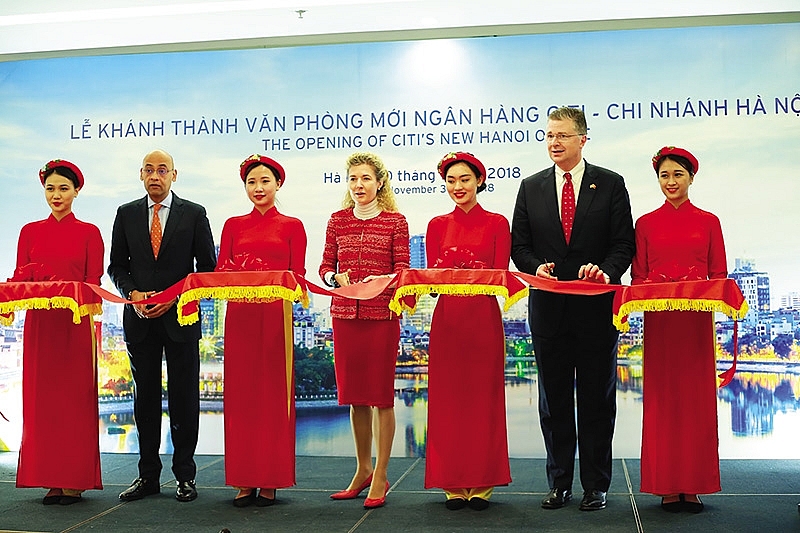Citi’s unbroken commitment to Vietnam’s progress
 |
| Citi opened its new Hanoi office last year, showing increasing commitment to the Vietnamese market |
Since then, Citi and the US Embassy in Vietnam have worked closely together to build strong working relations with the Vietnamese government and regulators.
Since 1994, Citi has played a role in facilitating economic relations and progress between the US and Vietnam. As American corporates began looking to the Southeast Asian nation for investment opportunities, Citi provided its balance sheet and global network to offer banking services for these companies. It integrated Vietnam into global supply chains, created employment, and supported the industry and overall economy to become more productive and efficient.
Today, Vietnam’s growth potential and untapped opportunities continue to attract investors. Citi is proud to support Vietnam as it becomes a sought-after destination for US firms looking to expand in Asia.
Speaking at the opening of Citi’s new office in Hanoi in November 2018, Daniel Kritenbrink, US Ambassador to Vietnam, said, “Our fundamental goal is for the United States to be a vital partner in supporting the development of a strong, prosperous, independent Vietnam that contributes to international security, engages in free, fair, and reciprocal trade, and respects the rule of law. We could not achieve this without partners in the business community, such as Citi.”
Today, the US’ relations with Vietnam are the strongest they have ever been. The US is Vietnam’s biggest export market and is one of the top investors in Vietnam. Investments include manufacturing and infrastructure, high-quality consumer goods, agriculture, industrial products, technology, and services.
The US is deeply investing in Vietnam’s future, and Citi continues to play a vital role in advancing Vietnam’s continued economic progress, including the digital transformation of the local banking landscape.
These contributions were reaffirmed by Dao Minh Tu, Deputy Governor of the State Bank of Vietnam (SBV), when he spoke at a meeting with a Citi delegation led by Alberto Cribiore, vice chairman of the Institutional Clients Group, in October 2018.
Tu noted Citi’s digital progress and capabilities and the value that the group’s experience and knowledge bring to the banking industry in Vietnam. He also expressed his intent for Citi and the SBV to continue to collaborate, through Citi’s participation in the central bank’s policy-making process and the bank’s involvement in seminars and training related to digital banking.
Citi Vietnam was recently the first bank to offer virtual card accounts in the country, giving corporate clients in the country the ability to use a next-generation digital payments solution as part of their business operations.
In April, Citi introduced biometric authentication for corporate clients in addition to consumer banking clients. On the consumer banking front, Citi Vietnam is the first market within Citi globally to achieve a 100 per cent e-statement penetration.
The SBV has welcomed Citi’s progress in e-payment and digital solutions. These milestones are well-aligned with the Vietnamese government’s master plan on e-commerce development to encourage a move towards a cashless society.
This year marks the 25th anniversary of Citi’s and the American Chamber of Commerce’s (AmCham) presence in Vietnam. Speaking as chair at AmCham Hanoi’s 2019 US-Vietnam Business Summit, Natasha Ansell, Citi country officer for Vietnam said, “American companies understand the link between business operations and society and do their best to conduct business in a way that creates long-term economic and social values.”
This statement embodies what both Citi and AmCham have done and will continue to do in Vietnam: improving business conditions to strengthen the private sector and promoting as well as facilitating socio-economic development in the country.
What the stars mean:
★ Poor ★ ★ Promising ★★★ Good ★★★★ Very good ★★★★★ Exceptional
Related Contents
Latest News
More News
- Private capital funds as cornerstone of IFC plans (February 20, 2026 | 14:38)
- Priorities for building credibility and momentum within Vietnamese IFCs (February 20, 2026 | 14:29)
- How Hong Kong can bridge critical financial centre gaps (February 20, 2026 | 14:22)
- All global experiences useful for Vietnam’s international financial hub (February 20, 2026 | 14:16)
- Raised ties reaffirm strategic trust (February 20, 2026 | 14:06)
- Sustained growth can translate into income gains (February 19, 2026 | 18:55)
- The vision to maintain a stable monetary policy (February 19, 2026 | 08:50)
- Banking sector faces data governance hurdles in AI transition (February 19, 2026 | 08:00)
- AI leading to shift in banking roles (February 18, 2026 | 19:54)
- Digital banking enters season of transformation (February 16, 2026 | 09:00)

 Tag:
Tag:




















 Mobile Version
Mobile Version